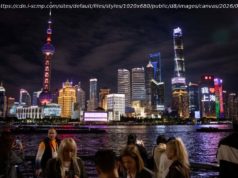Here’s what you need to know to start your day.
(Want to get this briefing by email? Here’s the sign-up .)
Good morning. More bombs found in a divided nation, the E. U. moves to protect the ocean, Frankenstein’s monster turns 200. Here’s what you need to know:
• At least 10 bombs. One common thread.
Law enforcement found two new explosive devices, addressed to former Vice President Joe Biden and the actor Robert De Niro, a day after similar devices were sent to other prominent figures who have criticised President Trump. Above, Mr. De Niro’s production studio in New York.
None of the explosives have harmed anyone so far, and it’s unclear who is behind them.
Mr. Trump first condemned the attempted attacks and called for unity. Then he struck a different tone, blaming the news media and Democrats for gaping political fissures.
Analysis: Crikey explains why George Soros, one of the targets, is relevant in Australia. [Article is paywall free for Times readers]
_____
• The E. U. moves toward a ban on single-use plastics.
The European Parliament overwhelmingly voted to ban plastic items like straws, cotton-swab sticks and cutlery by 2021, reflecting urgent environmental concerns about plastic waste in the oceans.
Under the new rules, other plastics that don’t have practical alternatives yet would be reduced by at least 25 percent by 2025 and 90 percent of beverage bottles would be recycled. Above, volunteers clearing up waste in London.
The next step: Parliament will enter negotiations with all 28 member states to reach a final legislative decision by the end of the year.
P. S.: China used to recycle about half of the globe’s plastic and paper waste, but this year it shut its doors, leading to mounting piles of rubbish around the world.
_____
• China and Russia listening in on President Trump.
When Mr. Trump calls old friends on one of his iPhones, American intelligence reports indicate that Chinese and Russian spies are often listening, a Times investigation found.
The president’s aides have urged him to use the secure White House landline, but he has refused to give up his iPhone. Officials said they could only hope he refrained from discussing classified information on them.
China’s response? An official ridiculed The Times’s investigation but didn’t deny its findings. She suggested that Mr. Trump should use a Huawei phone instead to improve security.
In case you’re wondering: President Xi Jinping and President Vladimir Putin of Russia avoid using cell phones. Former President Barack Obama used a pared-down iPhone in his second term that couldn’t make calls and didn’t have a camera or a microphone.
_____
• Evidence of China’s meddling in New Zealand.
An audio recording leaked to the news media last week, by the lawmaker pictured above, revealed two politicians in New Zealand discussing a $66,000 donation from an unnamed wealthy businessman who had connections to the Chinese government and wanted influence in Parliament.
The conversation was the latest in a series of scandals that have pointed to the increased vulnerability of New Zealand’s political system to external interference, sparking a national firestorm.
With China seeking to expand its influence throughout the Pacific region, many wonder if it’s time to change New Zealand’s lobbying laws, which allow some donations to remain anonymous.
_____
• Google protected three male executives accused of sexual misconduct over the past decade. One — Andy Rubin, the creator of Android, above — was paid a $90 million exit package. Read our investigation.
• Cathay Pacific, Hong Kong’s flagship airline, said hackers gained access to the personal data of as many as 9.4 million passengers .
• Apple News has so far avoided fake news scandals with its radical (for the tech industry) approach: using human editors .
• U. S. stocks were up. Here’s a snapshot of global markets.
• Saudi Arabia’s public prosecutor said the killing of the dissident journalist Jamal Khashoggi was “premeditated,” yet another shift in the country’s explanation for his death. [ The New York Times]
• President Trump is preparing to order at least 800 Army troops to the southern border, a Department of Defense official said. The move would bolster an election-season push by Republicans to stoke fears of migrants. [ The New York Times]
• The caravan of migrants traveling through Mexico has become the subject of viral rumors on social media. We debunk some of the false claims. [ The New York Times]
• Pakistan’s cash-strapped government is running a crowdsourcing campaign to raise $14 billion for two new dams to help with the country’s water and electricity shortages. [ The New York Times]
• A French free climber who calls himself Spider-Man climbed the tallest skyscraper in the City of London. [ The New York Times]
• Fewer North Korean defectors are arriving in the U. S., in part because of the Trump administration’s overall curb on refugee admissions. [ The New York Times]
• Malayan tigers, already endangered, are facing a new threat as durian plantations replace forest habitat in Malaysia — to satisfy China’s taste for the pungent fruit. [ The Guardian]
Tips for a more fulfilling life.
• Recipe of the day: Looking for a side dish? Try broccoli and scallions with a Thai-style vinaigrette .
• One thing you can do to reduce your carbon footprint: Choose pet food carefully .
• Dark circles around your eyes can be stubborn. We asked experts for their best treatments.
• Dr. Frankenstein’s monster turns 200 this year. Mary Shelley’s enduring novel has made the rare journey from literature into common myth, becoming an allegory for everything from gender equality to racism.
• Lavender is soothing: Its indulgent scent and particular shade of purple just feel relaxing. But now it seems the herb’s purported powers to ease anxiety could be more than folk medicine — at least in mice.
• In memoriam: Annapurna Devi, a noted Indian classical musician and teacher who was married to the famous sitarist Ravi Shankar. She stopped playing in the 1960s, a mystery some explained by saying Mr. Shankar was jealous of her fame. She died at age 91.
Emily Post, the longtime authority on etiquette in American life, was born on Oct. 27,1872, according to her biographer . (There is some disagreement about the date; the Times obituary for her in 1960 cited 1873.)
Although Mrs. Post, above, addressed questions about champagne flutes and special forks, her advice covered many other parts of society.
Her book “Etiquette” was published in 1922. It’s on its 19th edition today, written by Mrs. Post’s great-great-grandchildren.






